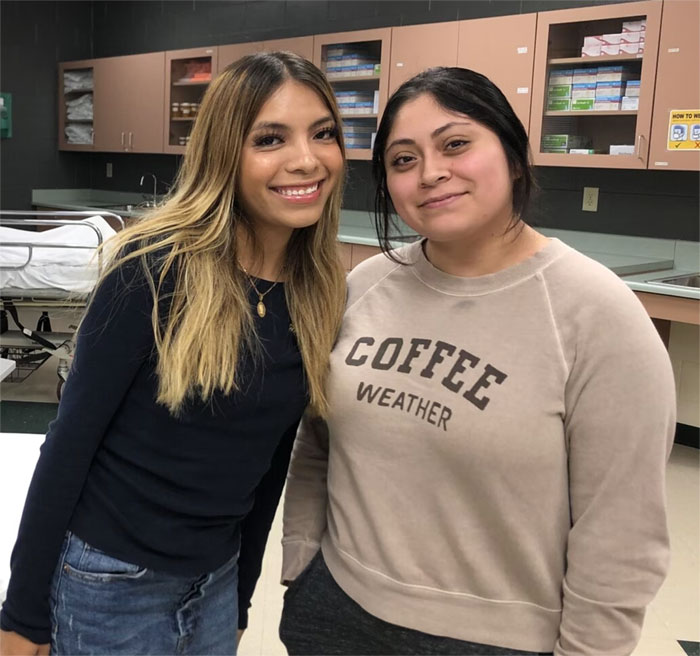Wisconsin nurses are not as diverse as their patients. A new Carroll University program aims to train more Hispanic nurses

Viviana Sanchez, 19, and Arisdelcy Gonzalez, 21, are first-year students in Carroll’s associate degree nursing program at the United Community Center.
That’s one reason Arcelay wanted to become a nurse. But she became a mother first and put off her nursing goals.
“It was always in the back of my mind, like something I had to do. Like, oh you got to do it, you got to do it,” Arcelay said. “But this program, it kinda was like right at my doorstep. Like this is the time.”
Arcelay applied last fall and was accepted to Carroll’s first cohort of the associate degree in nursing, or ADN program, which currently enrolls about 30 students. Arcelay is now in her second year, going to class on the UCC campus and doing clinical rotations at St. Luke’s hospital, where she recently had a Spanish-speaking patient.
“Having my first patient that I actually had in the hospital, the relief he had when he was sitting there – he even joked,” Arcelay said. “It made his experience in the hospital more better, you could tell. He was telling stories of his childhood. He gave more than he would have given if I didn’t speak his language.”
Carroll started this program to attract students like Arcelay, who have connections to the south side neighborhood and are looking for a pathway into nursing.
“It’s bringing the nursing program to the community rather than having students of the community go 20 miles west to Waukesha,” said ADN program director Lori Magestro.
Magestro said it’s unusual for a four-year private university to offer a two-year associate degree. Carroll took this step because nurses are in such high demand.
“There is a nursing shortage,” Magestro said. “And the nursing shortage was serious, it has moved to critical, and even moving towards dire. We are severely short of nurses.”
There’s an even greater shortage of Hispanic nurses. In Wisconsin, about 8% of the population identifies as Hispanic, but just about 2% of the nursing workforce does. Increasing diversity in healthcare is one way to address racial disparities in health outcomes.
“It’s not just about representation,” said Erika Colon, founding president of the Greater Milwaukee chapter of the National Association of Hispanic Nurses. “In order to have healthier communities, we need to have Hispanic providers. Patients in general do better when they are cared for by people who look like them, that have cultural similarities, that speak their language.”
United Community Center executive director Laura Gutierrez said she struggles to find bilingual nurses for UCC’s programs.
“And so our goal and my hope is that this program will ensure the needs of the community can be met in the future,” said Gutierrez.
Carroll has drawn a more diverse student population by locating the ADN program on the south side of Milwaukee. About 50% of the ADN students are minorities, compared to just about 8% of Carroll’s bachelor’s in nursing, or BSN students.
Viviana Sanchez, 19, switched from Carroll’s BSN program to the ADN program.
“I’m like, wow, this is perfect. I go to a private college on the south side,” Sanchez said. “And I’m just 10 minutes away from home. I feel at home, and I feel like my main goal as being a nurse is I want to come back and help my community. What I really want to do is maybe work at a clinic on the south side because I am bilingual, and I can maybe give back to my community in that way.”
Sanchez and most of the other students plan to eventually get their bachelor’s degrees after they start working as nurses and can get tuition reimbursement from their employers. The first cohort of Carroll ADN students graduates next year.
